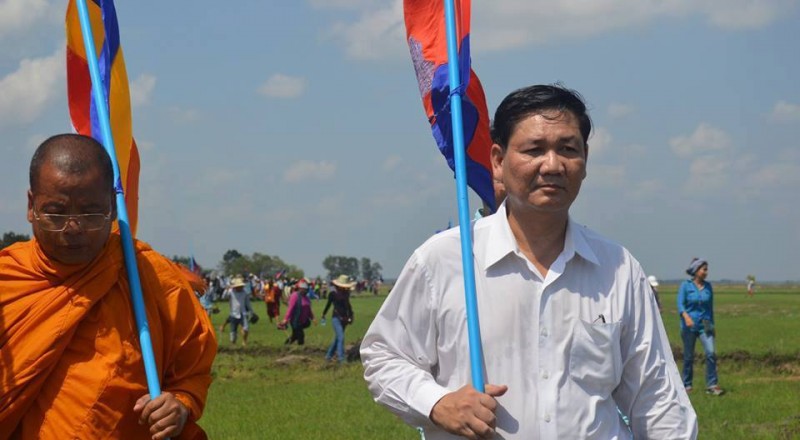Homelessness affects every single country and is spreading with impunity – New UN report
ភាពគ្មានផ្ទះសម្បែងធ្វើឱ្យប៉ះពាល់ដល់ប្រទេសនិមួយៗ ហើយបានរីករាលដាលប្រកបដោយនិទណ្ឌភាព
Sat the 12th Waning Moon of Māgha B.E.2559, March 5, A.D.2016 Year of the Goat
 ទីក្រុងហ្ស៊ឺណែវ (៣ មីនា ២០១៦) – ភាពគ្មានផ្ទះសម្បែងគឺជាស្ថានភាព ពិតនៃជីវិត ដែលកើតមាននៅគ្រប់ប្រទេសទាំងអស់ ដោយមិនគិតពីកម្រិតនៃការអភិវឌ្ឍប្រព័ន្ធសេដ្ឋកិច្ច ឬអភិបាលកិច្ចរបស់ប្រទេសទាំងនោះឡើយ ហើយបញ្ហានេះបានរីករាលដាលនូវនិទណ្ឌភាព អ្នករាយការណ៍ពិសេសរបស់អង្គការសហប្រជាជាតិ ស្តីពីសិទ្ធិលំនៅដ្ឋាន លោកស្រី លេឡានី ហ្វារហា (Leilani Farha) បានរំលឹកនៅថ្ងៃនេះ នៅពេលបង្ហាញរបាយការណ៍ចុងក្រោយបំផុតរបស់លោកស្រី ជូនក្រុមប្រឹក្សាសិទ្ធិមនុស្ស អ.ស.ប។ នៅក្នុងរបាយការណ៍នេះ ដែលអាចទាញយកមកអានជាភាសាអង់គ្លេស អ្នករាយការណ៍ពិសេសពិនិត្យមើលអំពីរបៀប ដែលភាពគ្មានផ្ទះសម្បែងបង្កឡើងដោយសារតែការខកខានរបស់រដ្ឋក្នុងការឆ្លើយតបទាំងទៅនឹងករណីមួយៗ ទាំងទៅនឹងបុព្វហេតុជារចនាសម្ព័ន្ធ ការបោះបង់ចោល ទំនួលខុសត្រូវ ចំពោះកាតព្វកិច្ចការពារសង្គម និងអនុញ្ញាតឲ្យមានការរកម្រៃលើអចលនទ្រព្យ និងការវិនិយោគដោយមិនបានធ្វើនិយតកម្មត្រឹមត្រូវ ផាត់មនុស្សជាច្រើនចេញពីលទ្ធភាពទទួលបានលំនៅដ្ឋាន។ សូមអានសេចក្តីប្រកាសព័ត៌មានទាំងស្រុងជាភាសាអង់គ្លេស។ [ចុចតំណភ្ជាប់ទៅសេចក្តីប្រកាសព័ត៌មាន – សូមមើលខាងក្រោម]។ អង់គ្លេស ។
ទីក្រុងហ្ស៊ឺណែវ (៣ មីនា ២០១៦) – ភាពគ្មានផ្ទះសម្បែងគឺជាស្ថានភាព ពិតនៃជីវិត ដែលកើតមាននៅគ្រប់ប្រទេសទាំងអស់ ដោយមិនគិតពីកម្រិតនៃការអភិវឌ្ឍប្រព័ន្ធសេដ្ឋកិច្ច ឬអភិបាលកិច្ចរបស់ប្រទេសទាំងនោះឡើយ ហើយបញ្ហានេះបានរីករាលដាលនូវនិទណ្ឌភាព អ្នករាយការណ៍ពិសេសរបស់អង្គការសហប្រជាជាតិ ស្តីពីសិទ្ធិលំនៅដ្ឋាន លោកស្រី លេឡានី ហ្វារហា (Leilani Farha) បានរំលឹកនៅថ្ងៃនេះ នៅពេលបង្ហាញរបាយការណ៍ចុងក្រោយបំផុតរបស់លោកស្រី ជូនក្រុមប្រឹក្សាសិទ្ធិមនុស្ស អ.ស.ប។ នៅក្នុងរបាយការណ៍នេះ ដែលអាចទាញយកមកអានជាភាសាអង់គ្លេស អ្នករាយការណ៍ពិសេសពិនិត្យមើលអំពីរបៀប ដែលភាពគ្មានផ្ទះសម្បែងបង្កឡើងដោយសារតែការខកខានរបស់រដ្ឋក្នុងការឆ្លើយតបទាំងទៅនឹងករណីមួយៗ ទាំងទៅនឹងបុព្វហេតុជារចនាសម្ព័ន្ធ ការបោះបង់ចោល ទំនួលខុសត្រូវ ចំពោះកាតព្វកិច្ចការពារសង្គម និងអនុញ្ញាតឲ្យមានការរកម្រៃលើអចលនទ្រព្យ និងការវិនិយោគដោយមិនបានធ្វើនិយតកម្មត្រឹមត្រូវ ផាត់មនុស្សជាច្រើនចេញពីលទ្ធភាពទទួលបានលំនៅដ្ឋាន។ សូមអានសេចក្តីប្រកាសព័ត៌មានទាំងស្រុងជាភាសាអង់គ្លេស។ [ចុចតំណភ្ជាប់ទៅសេចក្តីប្រកាសព័ត៌មាន – សូមមើលខាងក្រោម]។ អង់គ្លេស ។
Geneva (3 March 2016) – Homelessness is a fact of life in all countries of the world, regardless of the level of development of their economic or governance systems, and it has been spreading with impunity, the United Nations Special Rapporteur on the right to housing, Leilani Farha, warned today during the presentation of her latest report to the UN Human Rights Council.
In the report, which can be read in English here, the Special Rapporteur examines how homelessness is caused by States’ failures to respond both to individual circumstances and to a range of structural causes, abandoning responsibility for social protection and allowing unregulated real estate speculation and investment to exclude a growing number of people from any form of housing.
“Homelessness is a result of State acquiescence to real estate speculation and unregulated markets — a result of treating housing as a commodity rather than as a human right,” the independent expert stressed.
“The common denominator in virtually all structural causes of homelessness is government decision making inconsistent with human rights,” she said. “This has left millions of people subject to a violation of rights to life, health, housing, equality and non-discrimination, among others.”
The Special Rapporteur pointed to the social stigma, discrimination, violence and criminalization experienced by those who are homeless. From individuals sleeping on the streets, to families in makeshift dwellings, Ms. Farha’s statement to Council highlights the urgency of fighting the invisibility of the issue.
The expert urged all governments to recognize homelessness as a human rights crisis and commit to eradicating this global phenomenon by 2030, in line with the new UN Sustainable Development Goals.
“States must address the root causes of homelessness by establishing national strategies anchored in human rights and the right to adequate housing. We have been silent and have failed to tackle one of the most pervasive violations of human rights, but our lack of action can make us complicit,” she underscored.
The Special Rapporteur noted that 2016 can be a catalyst for the discussion on homelessness as the global community starts implementing the Sustainable Development Goals and prepares for Habitat III (the world Conference, on housing and sustainable urban development).
(*) Check the Special Rapporteur’s report: http://ap.ohchr.org/documents/dpage_e.aspx?si=A/HRC/31/54
Ms. Leilani Farha (Canada) is the UN Special Rapporteur on adequate housing as a component of the right to an adequate standard of living, and on the right to non-discrimination in this context. She took her function in June 2014. Ms. Farha is the Executive Director of the NGO Canada without Poverty, based in Ottawa, Canada. A lawyer by training, for the past 20 years Ms. Farha has worked both internationally and domestically on the implementation of the right to adequate housing for the most marginalized groups and on the situation of people living in poverty. Learn more, log on to: http://www.ohchr.org/EN/Issues/Housing/Pages/HousingIndex.aspx
The Special Rapporteurs are part of what is known as the Special Procedures of the Human Rights Council. Special Procedures, the largest body of independent experts in the UN Human Rights system, is the general name of the Council’s independent fact-finding and monitoring mechanisms that address either specific country situations or thematic issues in all parts of the world. Special Procedures’ experts work on a voluntary basis; they are not UN staff and do not receive a salary for their work. They are independent from any government or organization and serve in their individual capacity.
For more information and media requests please contact Juana Sotomayor (+41 22 917 9445 / jsotomayor@ohchr.org) or write to srhousing@ohchr.org
For media inquiries related to other UN independent experts:
Xabier Celaya, UN Human Rights – Media Unit (+ 41 22 917 9383 / xcelaya@ohchr.org)
Related
សូមគាំទ្រឧបត្ថម្ភ សហគមន៍ខ្មែរក្រោម Support KKC
សូមអរគុណដ៏ជ្រាលជ្រៅចំពោះសប្បុរសជននូវវិភាគទានទាំងនេះ។
We’re On Facebook

Sign in
Click here to reload the page over ssl.




